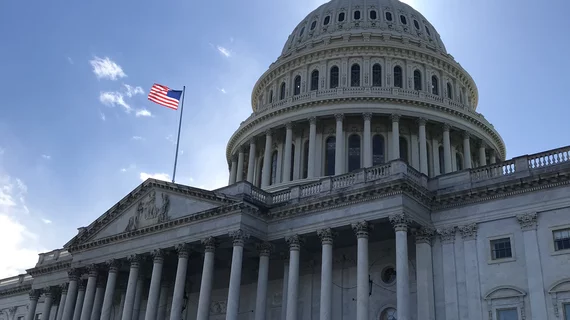The Society for Cardiovascular Angiography and Interventions (SCAI) is asking its interventional cardiologist members to take action to prevent further cuts in Medicare payments in 2024 by contacting their representatives. There were substantial cuts in Centers for Medicare and Medicaid Services (CMS) payments to physicians in 2023. Further cuts each year can only be prevented if Congress changes the laws for how CMS pays physicians.
"We must brace ourselves for the acceleration of economic instability that will challenge the viability of practices and adversely affect patient access, disproportionately affecting Black, Latino, and rural Medicare patients," reads a letter to SCAI members from members of SCAI's Government Relations Committee and Political Action Committee published in the Journal of the SCAI this week.[1] "This undermines the economic viability of clinical practices and makes critical care more difficult to access."
The CMS final physician fee schedule (PFS) on Nov. 1, 2022 reduced 2023 payments by 4.5%. The SCAI Government Relations Committee and other medical societies have staunchly opposed these cuts. Through the omnibus spending legislation passed at the end of 2022, Congress prevented 2.5% of the conversion factor cut in 2023 and 1.25% of the cut in 2024.
CMS payments are reduced each year because of budget neutrality requirements that require the federal agency to keep to its budget by reducing what it pays providers. As more patients enter the Medicare system and the demand for medical services increases among baby boomers, the prices CMS pays for these services decreases under budget neutrality rules. This can only be changed through an act of Congress.
"As an organization, the SCAI must ensure federal policy aligns with the economic realities of our field and that Congress reforms PFS to make it sustainable in future years," the letter states.
According to the letter, Congress both failed to fully prevent the proposed reductions from CMS and allowed for the further phase-in of the calculation of clinical labor pricing, which SCAI said will substantially affect the financial viability of office-based practices.
CMS changes in clinic labor pricing will impact cardiology practices
Clinical labor staff, medical supplies and equipment costs are the three components of direct practice expense (PE) for the costs directly associated with providing a service or procedure. They are budget neutral, which means that an increase in payment for one component typically means a proportional decrease in payment in the other components, the authors of the letter wrote.
The authors said changes to clinical labor pricing will reduce reimbursement for many physicians, including interventional cardiologists. SCAI said these cuts continue a trend of cumulative payment reductions and a lack of inflationary adjustments over the past decade, reducing the PFS by 20% to 40% for office-based specialists.
The authors said it may seem reasonable to update the clinical labor data, but they said the faulty formula will result in significant reimbursement cuts. This is why the SCAI Government Relations Committee, along with other medical societies, worked with representatives Bobby Rush (D-IL) and Gus Bilirakis (R-FL) on a letter to urge the CMS to not finalize the clinical labor policy in the PFS Final Rule.
"A confluence of federal policy, high inflation and COVID-19 exacerbated the challenge to the economic viability of our practices. In addition to the negative effect on interventional cardiologists who are employed in hospitals or corporate-owned practices, even greater adverse economic pressures impede the ability of independently employed interventional cardiologists to viably operate. This reality drives a continued migration to health system employment, likely reducing competition and access in our health care environment," the letter states.
CMS cuts will disproportionally impact underserved communities
The letter states that economic instability affects patients who are dependent on Medicare and may have a profound, negative impact on health equity. The authors wrote that cuts in Medicare funding will disproportionately effect Latino, Black and rural patients. An example of this is the recommended reimbursement changes that decrease reimbursement for dialysis vascular access by 18% and for peripheral arterial revascularization procedures by 22%.
"For our Black patients who already face increased rates of peripheral arterial disease and amputations, these reductions pose a threat and will result in decreased access to clinic-based revascularization sites. In addition, potential clinic and hospital closures will likely limit geographic access to sites of care, further increasing a substantial divide between rural and metropolitan healthcare access," the authors wrote.
The SCAI Government Relations Committee is working with with a broad coalition to fight further CMS cuts. Partners include the CardioVascular Coalition, the Society for Vascular Surgery, and the United Specialist for Patient Access. Together, SCAI they are highlighting the negative effect of PFS budget neutrality requirements and emphasize the need for fundamental PFS reform on the Congressional level to make Medicare sustainable and CMS payments more equitable.
"Congressional failure to address this issue will result in fewer interventional cardiologists and avoidable harm to our patients,"the letter states.
Medicare has cut physician reimbursements 20% in past two decades
According to SCAI, Medicare payments to physicians have fallen 20% since 2001. In addition, CMS has not implemented inflationary cost updates and it added what SCAI canned unnecessary administrative burdens. The society said this threatens the ability of interventional cardiologists to serve Medicare patients.
SCAI urges members to ask Congressional leaders to support medicare reform in proposed bill
SCAI is urging members to contact their members of Congress and urge them to support the bipartisan House bill H.R.2474, the "Strengthening Medicare for Patients and Providers Act." It was introduced by Rep. Raul Ruiz (D-Calif.), a former emergency room physician.
The society said the bill, introduced April 4, would address payment uncertainty affecting Medicare-participating physicians and avoid a possible physician shortage for Medicare beneficiaries. The bill seeks to change the physician payment rate above the current law by providing an annual Medicare physician payment update tied to inflation, as measured by the Medicare Economic Index (MEI).
SCAI Government Relations set up a an easy-to-use form for members to send letters to Congress https://scai.quorum.us/campaign/45550/.

